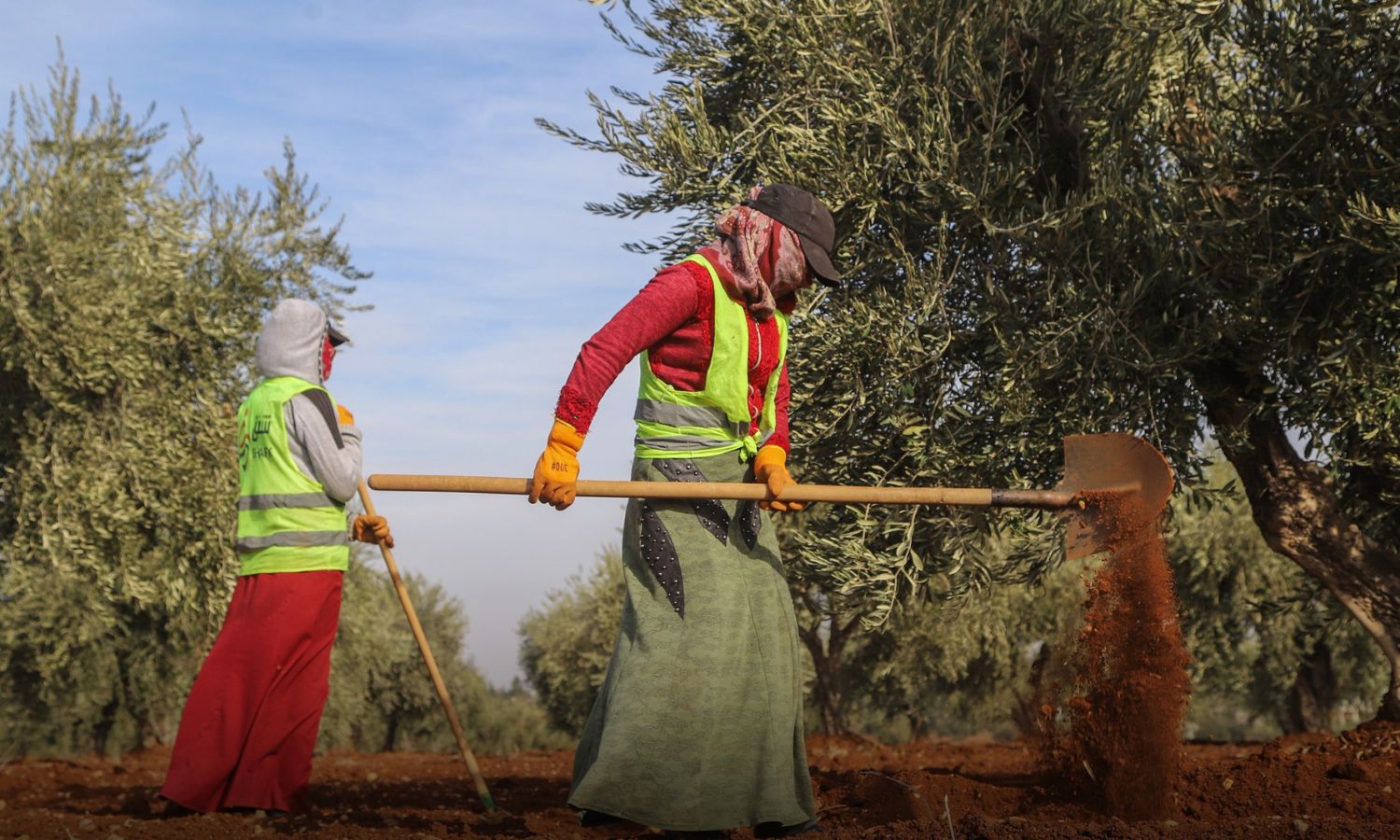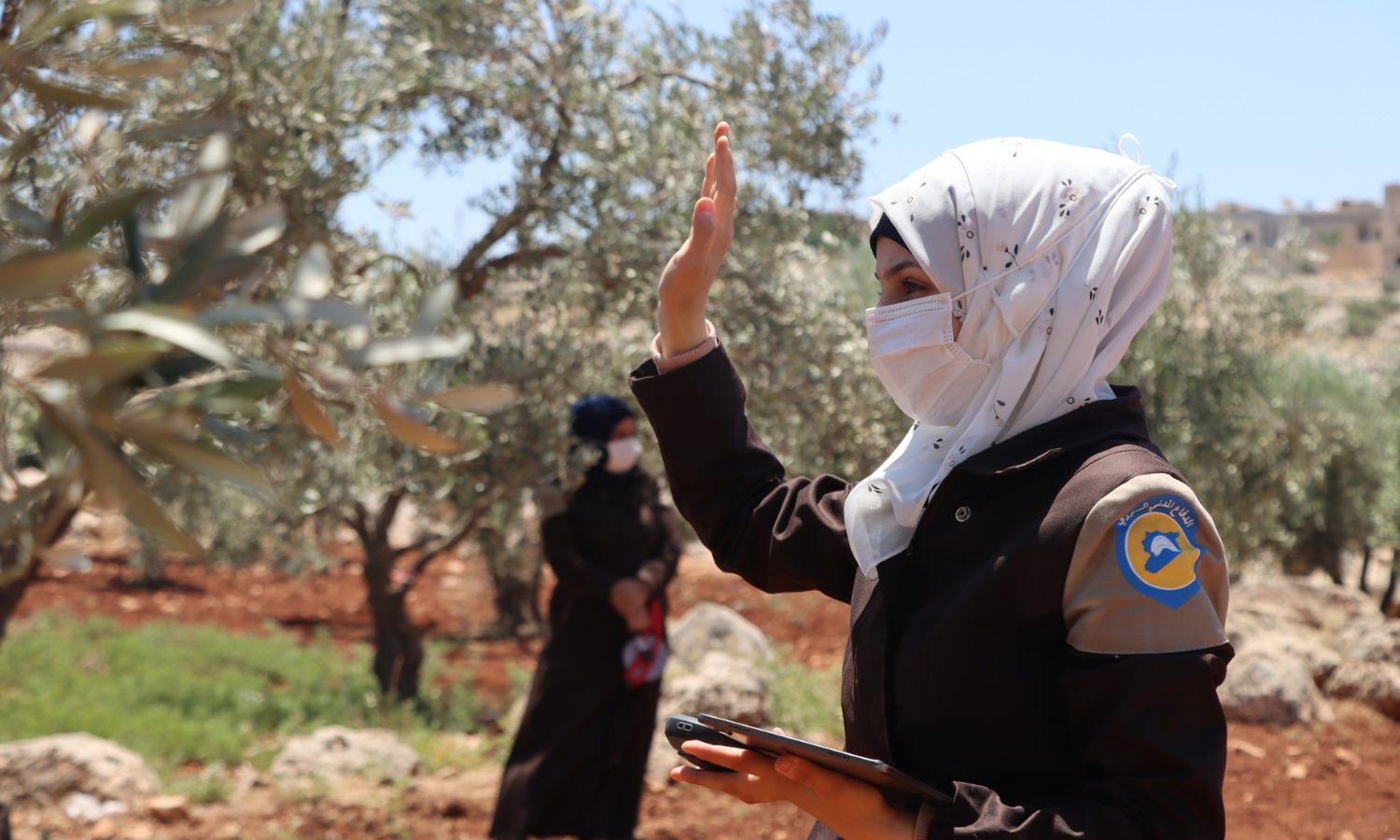



Enab Baladi – Abdul Karim al-Thalji
The conditions of war in Syria have weighed heavily on the lives of Syrians in general, with women being among its victims, paying a high price and facing difficulties from exposure to bombing, displacement, and the loss of a breadwinner.
Many women have been compelled to work in order to secure the needs of their families, taking on the responsibility themselves and facing difficulties, especially in balancing home needs with job requirements and obligations.
Enab Baladi met with a number of working women in non-governmental organizations in northwest Syria and learned about how they work, their struggles at work, and how they balance job requirements with family and household needs.
Agricultural engineer Huda al-Deiri, a displaced from Daraa to the city of Afrin in northwest Aleppo, works on an agricultural project with the Takaful al-Sham organization in the Afrin area. She told Enab Baladi that the organization does not discriminate between women and men in terms of salaries. However, the work she does is exhausting, especially since she is nearly 45 years old, indicating that she works as hard as men, walking long distances during work.
Al-Deiri, who is the breadwinner for her family, added that women’s suffering is doubled in jobs that require physical effort. She mentioned that she may be alone or with one of her colleagues, along with a car driver, and they travel long distances between the mountains and valleys of Afrin, which always causes them fear during their field tours. Additionally, during summer field visits, they face instances of encountering snakes or wild animals, and they, being women, cannot defend themselves as men can, according to her.
Al-Deiri continued, “Sometimes we have humanitarian aid distribution in camps and face harassment from beneficiaries, or assaults and insults, and sometimes gunfire. We do not have the ability to respond, especially since humanitarian organizations prohibit reciprocating harm with harm, and even if you are insulted, you must maintain your composure and dignity.”
The agricultural engineer mentioned that the organization considers the situation of women, as there are maternity leaves, but they differ according to the duration of the employee’s contract; if she has been with the organization for more than a year, she is entitled to a paid leave of up to 15 days, in addition to no job duties discrimination between women and men, but both genders perform the same tasks and works.
Recently, organizations have started to see the necessity of having female elements within any field team, especially in emergency response projects, due to special cases such as a widow being alone at home or a woman in “iddah” (waiting period), as part of the beneficiary identity verification process, according to al-Deiri.
For her part, Lawyer Huda Sarjawi, a legal advisor at the Shafak organization working in the Azaz area, said that working in camps is exhausting, as she conducts training missions and legal awareness raising for women in camps in various weather conditions, in addition to the large distances the field team covers to reach the camps, pointing out that she leaves for work early and does not return home until sunset, and she has a family with ongoing needs and requirements.
Sarjawi added, in her talk to Enab Baladi, that the suffering and fatigue are significant at work, as she spends most of the day in fieldwork and touring camps and training sessions, and in the evening she prepares reports and raises the documentation that takes more time and effort, besides the evening meetings, adding that sometimes she sleeps from exhaustion and has not finished raising the necessary data, so she returns early in the morning to catch up on work.
Sarjawi mentioned that she starts preparing food after her shift ends, which takes an additional effort because she arrives home before her daughter comes back from university, and after that, she prepares work files and sends them to the project supervisor, as she said.
Halima al-Khaled, an employee at an international organization in rural Idlib, told Enab Baladi that she resides in al-Dana in the northern countryside of Idlib. She leaves early in the morning before sunrise to her work in Harem city northwest of Idlib, and it takes more than an hour to reach the office, after which she starts her fieldwork in selecting and verifying beneficiaries before distributing humanitarian aid.
Al-Khaled added that her work ends and she reaches home at the call to Maghrib prayer, amid severe exhaustion, and does not regain her energy for several hours, in addition to not having many leaves at work, noting that she recently took special leave to visit her daughter who had given birth.
Al-Khaled does not recommend women considering jobs to work if it’s at the expense of their health and neglecting their children and home needs and requirements. However, she adds, “Women are forced to work despite all circumstances to secure a source of income for the house due to the high cost of living and price hikes being witnessed in the region.”
Eman al-Eid works as an educational supervisor at one of the humanitarian organizations concerned with the educational field, and she lives alone in the city of al-Dana, northern Idlib, with her four children, the eldest of whom is in the second grade of primary school. Her husband went to Turkey with their sick child on a treatment journey for more than two years and has not finished.
Al-Eid told Enab Baladi that she works only three days a week, with symbolic pay to meet her family’s needs, as her husband does not work in Turkey but follows the treatment of his son, who is suffering from a rare genetic disease. She added that she recently received an offer with a better salary, but she refused it due to the length of work hours and days, saying that committing to the new job would be at the expense of neglecting her children and securing their needs and educational follow-up.
She pointed out that she has a neighbor who helps her in taking care of her children when she goes to work, and this encouraged her to continue, despite the difficult conditions she lives in, according to her.

Mariam al-Asad, volunteer at the Syria Civil Defense in non-technical survey teams at war remnants removal centers (Syria Civil Defense)
Nadia Zaidan, a communication officer at the”Masar organization, said that what bothers her most about work is the long distances during tours, especially when crossing from Idlib to Jindires in the countryside of Afrin, pointing out that she sometimes stays more than an hour at checkpoints, causing the team to be late for their commitments.
She mentioned that there is no consideration for humanitarian field workers when crossing checkpoints, especially women who cannot afford to be away from home for too long.
There are military checkpoints between the areas of control of the Syrian Interim Government (SIG) in the countryside of Aleppo and the Salvation Government in Idlib, and two internal crossings connect them, which are Darat Izza- Al-ghazawiyah crossing, also known as Darat Izza road, and Deir Ballut- Atmah crossing.
Zaidan added that women bear a double effort in work pressure due to their weak physical build, but they are forced to endure, and that there are no special cards for employees in humanitarian organizations to facilitate their work in departments or when passing through checkpoints, noting that their time is tight as they always try to carry out their job tasks with appropriate speed and quality.
The deteriorating current economic and living conditions in northwestern Syria reinforce the need for women’s participation in labor and supporting the family, which is one of the solutions that women seek through to improve the reality of their family and society in the face of circumstances, according to a study by the Syria Civil Defense team.
Women who wish to work face obstacles, including the lack of education and experience, few available job opportunities, difficulties in balancing family care and work, lack of transportation to workplaces, and the absence of an educational degree, according to the study.
The study was based on interviews with 1,746 women within 160 villages in 32 sub-districts in the provinces of Idlib and Aleppo in January 2022, and only 9% of the women reported being harassed during work, with widows and divorcees more susceptible to harassment.
The participating women in the study indicated that society’s non-acceptance of the idea of women’s work is among the most prominent forms of harassment faced by working women, at 45%. Meanwhile, feelings of distrust in the working woman’s abilities and efficiency took the second spot at 32%.
The deliberate neglect by employers and colleagues was considered as a form of assault at 27%, while cases of harassment were the last on the list of factors of harassment for working women, at only 7% of respondents.
According to the study, working women often work under temporary contracts, 70% in professional fields including work within non-governmental organizations and the private sector, as well as within educational and health institutions, and 17% of working women work with daily wages. Also, 52% of women work under formal contracts, most of them within clinics, schools, and non-governmental organizations.
Despite the existence of training institutes that equip women with some skills and expertise, they engage in exhausting and dangerous professions to secure their various needs, amid rising prices and low wages.
Some women, especially those living in displaced persons camps across the north, resort to jobs locally known as men’s specialties, or dangerous activities such as searching through piles of garbage for plastic, amid the prevalence of unexploded ordnance from the remnants of war.
if you think the article contain wrong information or you have additional details Send Correction